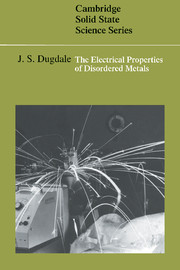Book contents
- Frontmatter
- Contents
- Preface
- 1 Context and content
- 2 Production and structure of metallic glasses
- 3 Electron transport in metals: introduction to conventional theory
- 4 Scattering
- 5 Simple liquid metals: Ziman theory
- 6 Phonons in disordered systems
- 7 Interactions and quasi-particles
- 8 Transition metals and alloys
- 9 The Hall coefficient of metallic glasses
- 10 Magnetoresistance
- 11 Electrical conductivity of metallic glasses: weak localisation
- 12 The interaction effect or Coulomb anomaly
- 13 The effect of the Coulomb interaction on conductivity
- 14 Influence of a magnetic field on the enhanced interaction effect
- 15 The thermopower of metals and alloys
- 16 Comparison with experiment
- Appendices
- Notes
- References
- Index
14 - Influence of a magnetic field on the enhanced interaction effect
Published online by Cambridge University Press: 21 January 2010
- Frontmatter
- Contents
- Preface
- 1 Context and content
- 2 Production and structure of metallic glasses
- 3 Electron transport in metals: introduction to conventional theory
- 4 Scattering
- 5 Simple liquid metals: Ziman theory
- 6 Phonons in disordered systems
- 7 Interactions and quasi-particles
- 8 Transition metals and alloys
- 9 The Hall coefficient of metallic glasses
- 10 Magnetoresistance
- 11 Electrical conductivity of metallic glasses: weak localisation
- 12 The interaction effect or Coulomb anomaly
- 13 The effect of the Coulomb interaction on conductivity
- 14 Influence of a magnetic field on the enhanced interaction effect
- 15 The thermopower of metals and alloys
- 16 Comparison with experiment
- Appendices
- Notes
- References
- Index
Summary
Magnetoresistance in the particle–hole channel
High fields
When a magnetic field is applied to the material, the relative phase of the two electrons in the processes we discussed in section 13.2.2 is not changed by the flux that passes through their common orbit because the electrons execute this in the same sense (not in opposite senses as in weak localisation) and so the effect on the phase is the same for both. On the other hand if the two electrons have antiparallel spins the magnetic field B changes their relative energy by the Zeeman splitting gμB. Here μ is the Bohr magneton and g is the splitting factor, which looks after any change in the magnetic moment of the electron introduced by its environment. In fact we are here considering electron–hole pairs so that since the hole has a spin opposite in sign to that of an electron the triplet state occurs when the electron and hole have antiparallel spins and the singlet state when they are parallel.
If we refer to Table 11.2 (p. 126), we see that in the triplet state only two out of the three spin wavefunctions involve parallel spins; the third is a composite state, which, like the singlet state, involves antiparallel spins. Thus the two components of the electron–hole pair with parallel spins are the ones that are split in energy by the magnetic field. The frequencies of the electron and the hole are correspondingly altered and for this reason dephasing occurs.
- Type
- Chapter
- Information
- The Electrical Properties of Disordered Metals , pp. 176 - 187Publisher: Cambridge University PressPrint publication year: 1995



